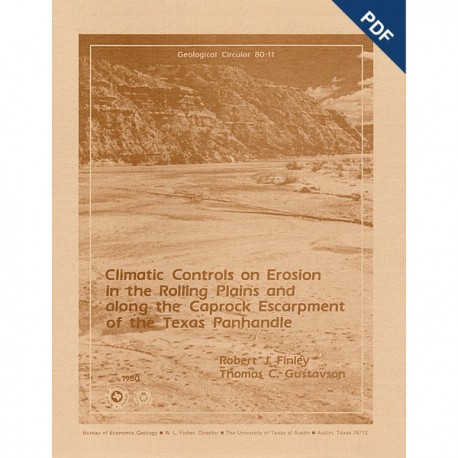Geological Circulars
-
Books & Reports
- Reports of Investigations
- Guidebooks
- Udden Series
- Geological Circulars
- Down To Earth
- Atlases of Major Oil and Gas Reservoirs
- Texas Memorial Museum Publications
- Environmental Geologic Atlas of the Texas Coastal Zone
- Mineral Resource Circulars
- Other Reports
- Seminars and Workshops
- Handbooks
- Submerged Lands of Texas
- Symposia
- Annual Reports
- Open File Reports
-
Maps & Cross Sections
- Thematic Maps
- Miscellaneous Maps, Charts & Sections
- Geologic Atlas of Texas
- STATEMAP Project Maps
- Geologic Quadrangle Maps
- Cross Sections
- Highway Geology Map
- Energy and Mineral Resource Maps
- Shoreline Change and Other Posters
- Wilcox Group, East Texas, Geological / Hydrological Folios
- Bouguer Gravity Atlas of Texas
- River Basin Regional Studies
- Featured Maps
- Posters
- Teachers & the Public
-
Geological Society Publications
- Gulf Coast Association of Geological Societies
- Alabama Geological Society
- Austin Geological Society
- Corpus Christi Geological Society
- Houston Geological Society
- Lafayette Geological Society
- Mississippi Geological Society
- New Orleans Geological Society
- South Texas Geological Society
- GCS SEPM Publications
- Historic BEG & UT Series
Climatic Controls on Erosion ...along the Caprock Escarpment...Texas Panhandle. Digital Download
GC8011D
For a print version: GC8011.
GC8011D. Climatic Controls on Erosion in the Rolling Plains along the Caprock Escarpment of the Texas Panhandle, by R. J. Finley and T. C. Gustavson. 50 p., 24 figs., 8 tables, 1980. doi: http://dx.doi.org/10.23867/gc8011D. Downloadable PDF.
To purchase this product in book format, please order GC8011.
ABSTRACT
The climate of the Texas Panhandle is primarily semiarid continental, exhibiting a pronounced peak in precipitation during the months of May through July. Storm data from a 22-county study area show a pattern of heavy, localized rainfall with high (1 to 5 inches/h or 25 to 127 mm/h) rainfall intensities for periods of 5 to 60 minutes. These characteristics are typical of the thunderstorm rainfall of the area. Depth-frequency relationships show mean 24-hour rainfall totals of 2.55 inches (65 mm), 4.25 inches (108 mm), and 5.07 inches (129 mm) for 2-, lo-, and 25-year return periods, respectively. As a result of intense thunderstorm rainfall activity in a predominantly grassland environment, rainsplash, sheetwash, and rillwash are significant processes of surface erosion. The low degree of induration of many Permian shales, siltstones, and sandstones also increases their erodibility within the Rolling Plains area. Thin soils characteristic of 6' to 24' slopes have only poor to fair capability to support grasses and shrubs; hence, vegetation has little mitigating effect on active erosional processes, especially along the Caprock Escarpment. Erosion pins at surface-process monitoring localities show 0.04 to 0.08 inch (1 to 2 mm) of erosion for a single typical thunderstorm and up to 2.4 inches (6.2 cm) of erosion for a 10-year return period storm. Greatest net erosion has been observed on slopes of 20' or greater with 10 percent or less vegetative cover. Erosion mechanisms are applicable only under the present interglacial climatic regime, which has probably prevailed for the past 8,000 years.
Keywords: Caprock Escarpment, climate, erosion, precipitation, rainfall, Rolling Plains, soils, Texas, Texas Panhandle, thunderstorms, vegetation
Citation
Finley, R. J., and Gustavson, T. C., 1980, Climatic Controls on Erosion in the Rolling Plains along the Caprock Escarpment of the Texas Panhandle: The University of Texas at Austin, Bureau of Economic Geology, Geologic Circular 80-11, 50 p. doi.org/10.23867/gc8011D.


